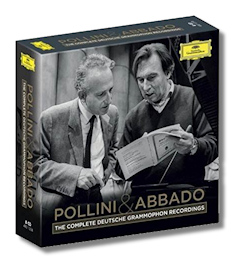
The Internet's Premier Classical Music Source
Related Links
-
Bartók Reviews
Beethoven Reviews
Brahms Reviews
Schoenberg Reviews
Schoenberg Reviews
Schumann Reviews - Latest Reviews
- More Reviews
-
By Composer
-
Collections
DVD & Blu-ray
Books
Concert Reviews
Articles/Interviews
Software
Audio
Search Amazon
Recommended Links
Site News
 CD Review
CD Review
The Complete Recordings on Deutsche Grammophon

- Ludwig van Beethoven:
- Piano Concerto #1 in C Major, Op. 15
- Piano Concerto #2 in B Flat Major, Op. 19
- Piano Concerto #3 in C minor, Op. 37
- Piano Concerto #4 in G Major, Op. 58
- Piano Concerto #5 in E Flat Major "Emperor", Op. 73
- Fantasia for Piano, Chorus & Orchestra in C minor, Op. 80 1,2
- Johannes Brahms:
- Piano Concerto #1 in D minor, Op. 15
- Piano Concerto #2 in B Flat Major, Op. 83
- Piano Concerto #2 in B Flat Major, Op. 83 4
- Béla Bartók:
- Piano Concerto #1 3
- Piano Concerto #2 3
- Luigi Nono: Como una ola de fuerza y luz for Soprano, Piano, Orchestra & Tape 4*
- Robert Schumann: Piano Concerto in A minor, Op. 54
- Arnold Schoenberg: Piano Concerto, Op. 42
Maurizio Pollini, piano
* Slavka Taskova, soprano
Berlin Philharmonic Orchestra/Claudio Abbado
1 Vienna Philharmonic Orchestra/Claudio Abbado
2 Vienna State Opera Choir
3 Chicago Symphony Orchestra/Claudio Abbado
4 Bavarian Radio Symphony Orchestra/Claudio Abbado
Deutsche Grammophon 4821358 8CDs
When I reviewed Deutsche Grammophon 4790913 last year, I cited that set as a mandatory acquisition for anyone who loved the piano. That box, which housed the great Maurizio Pollini's Beethoven, Brahms, and Mozart concertos, was reasonably priced and generally well selected. So is this one. Now, naturally you'll have to duplicate some stuff if you invest in both boxes. Also, if you're a long time collector, you'll have almost all of these recordings. The earlier box housed some rare imports, but the present set does score points for containing some repertoire that your everyday collector might be missing. More importantly, most of these recordings show both pianist and conductor at their very best.
Say what you will about Abbado, but he was generally a terrific concerto accompanist. Unlike his work with Martha Argerich, Pollini's recordings were captured before both his decline and interest in small, period-influenced ensembles. And so we find superlative Bartók from Chicago, and a fine Choral Fantasia (Beethoven) from Vienna. As I wrote previously, the Brahms Second Concerto – also from Vienna and set down in 1976 – may be one of the finest documents of these artists working together, and is easily the better of the two accounts found in this box. The live 1995 Brahms concertos from Berlin aren't bad, but they aren't special, either.
The Beethoven concertos are in Berlin. I wrote this previously: "This set has been critically acclaimed, but I can't shake the notion that I prefer Pollini's earlier collaborations with Böhm and Eugen Jochum. While Abbado proves a sensitive and intelligent accompanist, I've not convinced by the somewhat soggy attacks in the early concertos or the rather faceless brass and winds. Pollini plays objectively; with a somewhat hard sound that pinpoints the music's classicism. Abbado doesn't clip his phrases like his later readings with Martha Argerich, but soloist and conductor are heard to better effect elsewhere." That review left out the 'Emperor' which was with Böhm in Vienna; that version is again marginally preferable to the one included here.
Abbado recorded the Schumann Concerto three times, twice in Berlin. None of the three are what I'd consider a reference recording, but all of them are never less than respectable. Pollini is as serious an artist as they come, but even the poker-faced Rudolf Serkin was able to make a slightly more colorful account. On the other hand, this Schoenberg Concerto is quite fine, and the Nono is an unusual work that is very well done. While I'm not sure if this box has the essential nature of the previous set (those early recordings and the late Mozart are oh-so-compelling), fans of the conductor and pianist can buy the complete Argerich/Abbado box to go with this one and be very happy.
Copyright © 2016, Brian Wigman


















